啃论文俱乐部—移植Speexdsp到OpenHarmony标准系统(三)

- 大家好!我来自南京,在OpenHarmony成长计划啃论文俱乐部,与华为、软通动力、润和软件、拓维信息、深开鸿等公司一起,学习和研究操作系统技术,从今年1月11日加入OpenHarmony俱乐部已经有接近8个月时间了。笔者一直在思考啃论文给我带来了些什么,通过啃论文能为OpenHarmony做些什么。笔者利用大二升大三暑假两个月时间移植了Speexdsp这个三方库到OpenHarmony标准系统,而关于前面的问题我似乎找到了答案,现将啃论文和三方库移植分享经验如下:
speexdsp移植后已提交至openhamrony sig仓库:https://gitee.com/openharmony-sig/contest/tree/master/2022_OpenHarmony_thirdparty/speexdsp。
四、将三方库加入到OpenHarmony的编译体系
根据上一步分析结果,编写gn文件,将三方库加入到OpenHarmony的编译体系。
OpenHarmony编译构建子系统提供了一个基于Gn和ninja的编译构建框架。根据产品配置,编译生成对应的镜像包。其中编译构建流程为:
- 使用Gn配置构建目标。
- Gn运行后会生成ninja文件。
- 通过运行ninja来执行编译任务。
OpenHarmony三方库编译环境搭建
本次移植时在openharmony3.2Beta1版本上运行的,所以需要准备openharmony3.2Beta1的源码。
先在Widows上安装虚拟机,在虚拟机上安装Ubuntu18.04或者20.04。笔者使用的为Ubuntu20.04。
1、将Ubuntu Shell环境修改为bash。
- 打开终端执行
sudo dpkg-reconfigure dash
- 将Shell由dash改为bash。

- 选择<否>
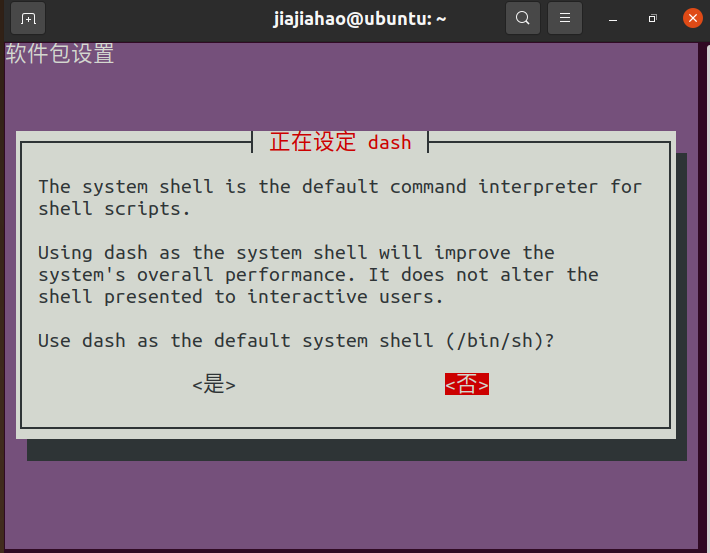
- 更改成功如下:
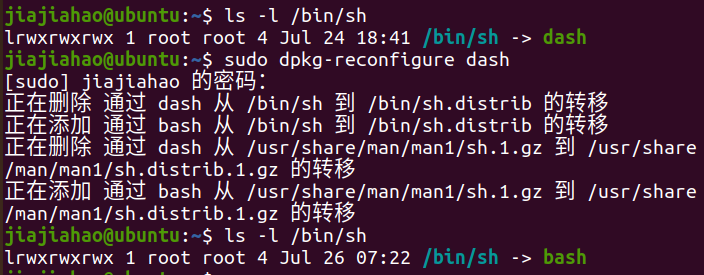
2、下载华为集成开发环境 DevEco Device Tool Linux版本,目前最新版本号为3.1.0.200。
HUAWEI DevEco Device Tool(以下简称DevEco Device Tool)是OpenHarmony面向智能设备开发者提供的一站式集成开发环境,支持OpenHarmony的组件按需定制,支持代码编辑、编译、烧录和调试等功能,支持C/C++语言,以插件的形式部署在Visual Studio Code上。
- 直接在Ubuntu上打开firefox输入下载地址下载。
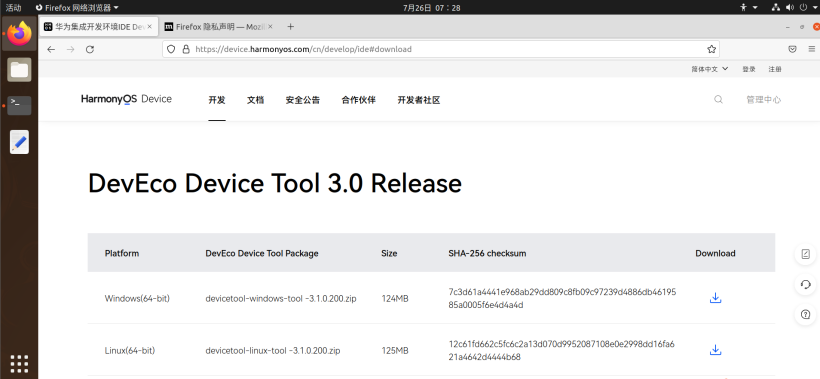
- 解压DevEco Device Tool安装包,并对解压后的文件赋权。
unzip devicetool-linux-tool-3.1.0.200.zip
chmod u+x devicetool-linux-tool-3.1.0.200.sh

- 安装DevEco Device。
- 执行命令安装DevEco Device。
sudo ./devicetool-linux-tool-3.1.0.200.sh
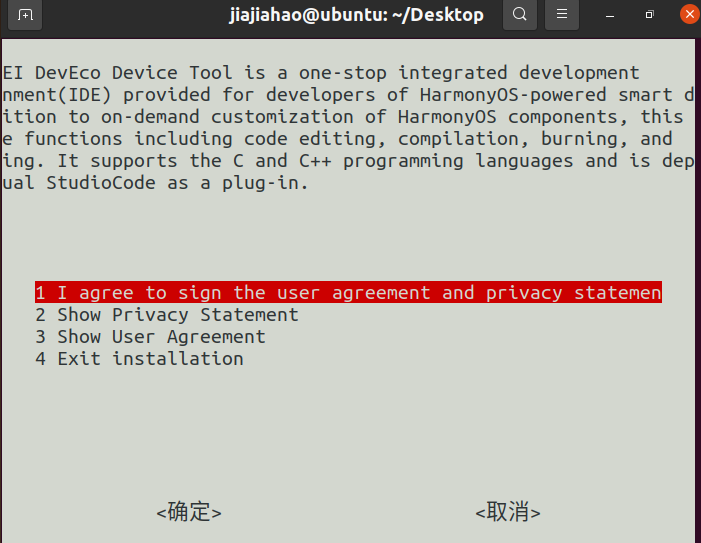
终端打印出这条信息说明安装成功。

3、获取标准系统源码。
执行命令sudo apt-get install git git-lfs安装git客户端和git-lfs。
- 配置git用户信息
git config --global user.name "yourname"
git config --global user.email "your-email-address"
git config --global credential.helper store
git config –global credential.helper store执行这个命令会在本地生成一个文本,上边记录配置。然后再拉取代码就不用再输入账号信息了。
- 进入gitee官网个人主页,个人头像下方就是user.name。
- 再进入设置点击邮箱管理就可以得到你的your-email-address。
- 安装gitee码云repo工具。
sudo apt-get install curl
sudo curl https://gitee.com/oschina/repo/raw/fork_flow/repo-py3 -o /usr/local/bin/repo
sudo chmod a+x /usr/local/bin/repo
sudo pip3 install -i https://repo.huaweicloud.com/repository/pypi/simple requests



- 使用repo+https下载发布Tag节点源码。
创建源码存放目录。
进入创建的源码存放目录,执行以下命令下载源码。
sudo ln -sf /usr/bin/python3 /usr/bin/python
repo init -u https://gitee.com/openharmony/manifest -b refs/tags/OpenHarmony-v3.2-Beta1 --no-repo-verify
repo sync -c
repo forall -c 'git lfs pull'
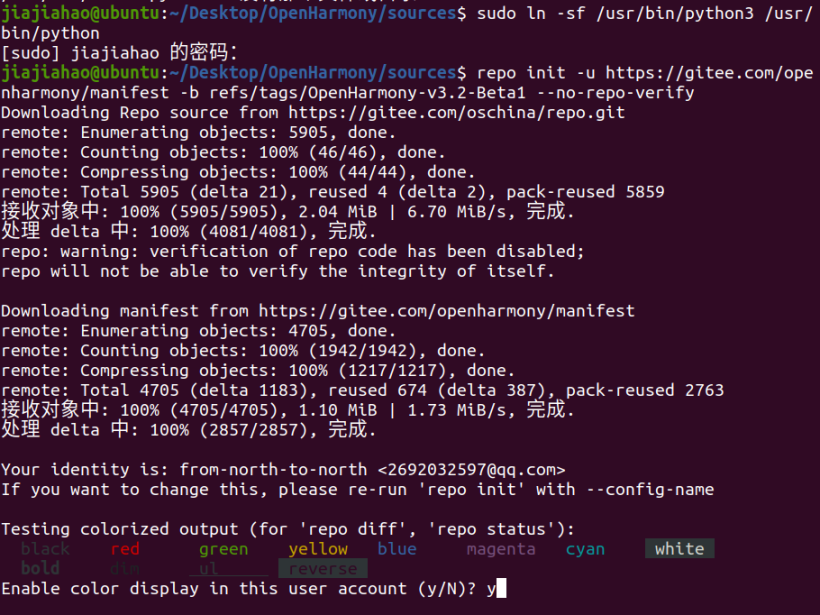
4、在源码目录下执行脚本安装编译器及二进制工具。
下载的prebuilts二进制默认存放在与OpenHarmony同目录下的OpenHarmony_2.0_canary_prebuilts下。
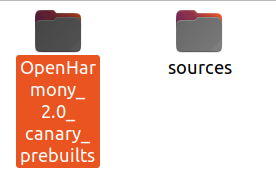
bash build/prebuilts_download.sh
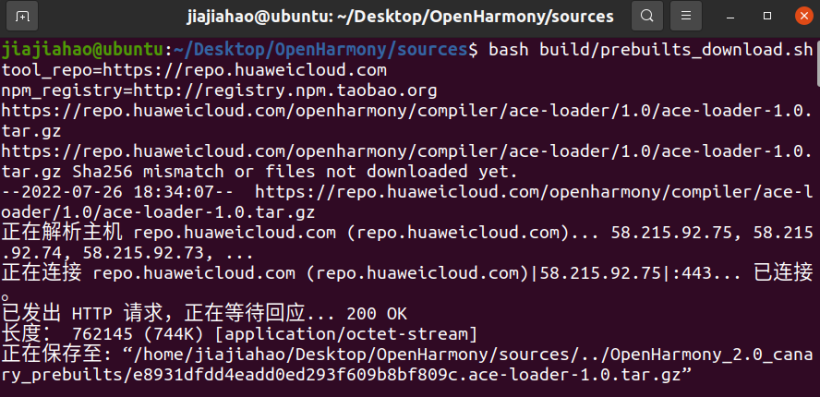
5、安装依赖工具。
sudo apt-get install binutils git git-lfs gnupg flex bison gperf build-essential zip curl zlib1g-dev gcc-multilib g++-multilib libc6-dev-i386 lib32ncurses5-dev x11proto-core-dev libx11-dev lib32z1-dev ccache libgl1-mesa-dev libxml2-utils xsltproc unzip m4 bc gnutls-bin python3.8 python3-pip ruby
6、最后测试一下OpenHarmony三方库编译环境。
在源码根目录下执行编译命令。
./build.sh --product-name rk3568 --ccache --build-target=要编译的部件名 --target-cpu arm64
#其中:--product-name rk3568 指定产品名为rk3568
#其中:--ccache 编译使用ccache
#其中:--target-cpu arm64 编译构建64位系统
在源码目录下执行编译zlib命令,生成libzlib.z.so。
./build.sh --product-name rk3568 --ccache --build-target=zlib

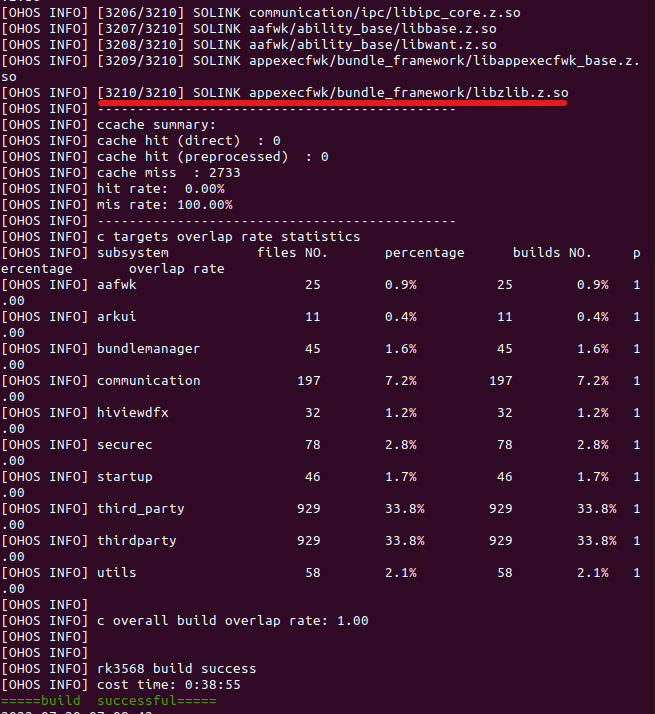
编译生成了libzlib.z.so,编译环境没问题。
配置speexdsp源码
下载完openharmony3.2Beta1源码后,将speexdsp的源码拷贝到openhamony的third_party目录下。
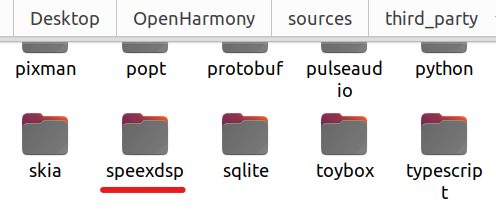
在OpenHarmony/sources/third_party/speexdsp和OpenHarmony/sources/third_party/speexdsp/libspeexdsp下分别编写一份BUILD.gn文件,完成speexdsp的gn及测试用例的gn化。测试用例指的是测试speexdsp功能的程序。
speexdsp编译gn化
OpenHarmony/sources/third_party/speexdsp下添加BUILD.gn文件。
OpenHarmony/sources/third_party/speexdsp/BUILD.g内容如下:
import("//build/ohos.gni")
config("speexdsp_nowarn_config"){
cflags = [
"-Wno-implicit-function-declaration",
"-Wno-pointer-sign",
"-Wno-unused-variable",
]
}
config("speexdsp_cflag_config"){
cflags = [
"-g",
"-O2",
"-fvisibility=hidden",
"-DHAVE_CONFIG_H",
]
ldflags = [
"-lm"
]
}
ohos_shared_library("speexdsp_share") {
sources = [
"libspeexdsp/preprocess.c",
"libspeexdsp/jitter.c",
"libspeexdsp/mdf.c",
"libspeexdsp/fftwrap.c",
"libspeexdsp/filterbank.c",
"libspeexdsp/resample.c",
"libspeexdsp/buffer.c",
"libspeexdsp/scal.c",
"libspeexdsp/smallft.c",
]
defines = [
"NL_DEBUG",
"speexdsp_EXPORTS",
]
configs = [
":speexdsp_cflag_config",
":speexdsp_nowarn_config"
]
include_dirs = [
".",
"libspeexdsp",
"include"
]
part_name = "speexdsp"
}
代码解析
第一行:
import("//build/ohos.gni")
import函数将ohos.gni文件导入到当前作用域。导入的文件是独立执行的,生成的作用域被复制到当前文件中。一个.gni文件会定义构建参数和模板。build目录下ohos.gni文件内容如下:
import("//build/config/sanitizers/sanitizers.gni")
import("//build/ohos/ndk/ndk.gni")
import("//build/ohos/notice/notice.gni")
import("//build/ohos/sa_profile/sa_profile.gni")
import("//build/ohos_var.gni")
import("//build/toolchain/toolchain.gni")
# import cxx base templates
import("//build/templates/cxx/cxx.gni")
if (support_jsapi) {
import("//build/ohos/ace/ace.gni")
import("//build/ohos/app/app.gni")
}
import("//build/templates/common/ohos_templates.gni")
# import prebuilt templates
import("//build/templates/cxx/prebuilt.gni")
第三行到第九行:
config("speexdsp_nowarn_config"){
cflags = [
"-Wno-implicit-function-declaration",
"-Wno-pointer-sign",
"-Wno-unused-variable",
]
}
- configs定义了该模块编译配置的环境变量speexdsp_nowarn_config,第24行ohos_shared_library定义了最终生成的模块名,这里代表此模块为最终生成libspeexdsp.z.so。所以在第五行到第七行中config中添加了编译libspeexdsp.z.so需要添加的编译器标志。
- 但是”-Wno-implicit-function-declaration”、“-Wno-pointer-sign””、-Wno-unused-variable”并非是分析speexdsp原生库得来的cflag编译器标志。
- 而是后来在ohos上编译验证过程中,根据编译报错信息添加的。如果不添加它们,执行./build.sh –product-name rk3568 –ccache –build-target=speexdsp命令后,则无法编译生成openharmony上的运行的libspeexdsp.z.so库,会出现编译警告信息-W-implicit-function-declaration、-W-pointer-sign、-W-unused-variable。解决办法就是在gn化时添加cflag标志”-Wno-implicit-function-declaration”、“-Wno-pointer-sign”“、-Wno-unused-variable”。

clang编译器警告消除:
- 出现警告的就是直接在-W后面加no,比如-Wimplicit-function-declaration改为 -Wno-implicit-function-declaration。
- 还有另外的一种方法:-Wimplicit-function-declaration=no。
第十一到第二十二行:
config("speexdsp_cflag_config"){
cflags = [
"-g",
"-O2",
"-fvisibility=hidden",
"-DHAVE_CONFIG_H",
]
ldflags = [
"-lm"
]
}
- configs定义了该模块编译配置的环境变量speexdsp_cflag_config,在第十三行到第十六行添加了编译需要添加的编译器标志 “-g”,“-O2”,“-fvisibility=hidden”, “-DHAVE_CONFIG_H”。
- “-g”,“-O2”,”-fvisibility=hidden”通过分析原生库config.log和makefile文件,具体请查看第二期内容。
- “-DHAVE_CONFIG_H”通过分析执行build命令后编译ohos上speexdsp的so库报错信息得来。

- 添加”-DHAVE_CONFIG_H”后仍然有报错信息,解决办法是把linux下编译speexdsp原生库./configure后生成的config.h放置在thrid_party/speexdsp下。

第二十四行到第五十二行:
ohos_shared_library("speexdsp_share") {
sources = [
"libspeexdsp/preprocess.c",
"libspeexdsp/jitter.c",
"libspeexdsp/mdf.c",
"libspeexdsp/fftwrap.c",
"libspeexdsp/filterbank.c",
"libspeexdsp/resample.c",
"libspeexdsp/buffer.c",
"libspeexdsp/scal.c",
"libspeexdsp/smallft.c",
]
defines = [
"NL_DEBUG",
"speexdsp_EXPORTS",
]
configs = [
":speexdsp_cflag_config",
":speexdsp_nowarn_config"
]
include_dirs = [
".",
"libspeexdsp",
"include"
]
part_name = "speexdsp"
}
- 第24行ohos_shared_library定义了最终生成的模块名,这里代表此模块为最终生成libspeexdsp.z.so。
- 第二十五行到第三十五行sources模块包含了需要编译的源码文件。
- 第四十六行到五十行include_dirs模块包含了编译依赖的头文件路径。
- 第五十一行part_name 该模块编译依赖的编译子系统组件名。该配置项是为了模块最终生成的so文件能在系统编译完后自动拷贝到系统目录中。如果没有配置该项,系统编译完后是不会自动将生成的so文件拷贝到系统目录。
测试用例gn化
OpenHarmony/sources/third_party/speexdsp/libspeexdsp下添加BUILD.gn文件。
import("//build/ohos.gni")
config("test_nowarn_config"){
cflags = [
"-Wno-sign-compare",
"-Wno-pointer-sign"
]
}
config("speexdsp_cflag_config") {
ldflags = [ "-lm" ]
cflags_cc = [
"-g",
"-O2",
"-fvisibility=hidden",
]
}
config("speexdsp_config") {
include_dirs = [
"//third_party/speexdsp/include"
]
}
ohos_executable("testdenoise"){
public_configs = [
":speexdsp_config",
":test_nowarn_config"
]
sources = [
"testdenoise.c"
]
configs = [
":speexdsp_cflag_config",
]
deps = [
"//third_party/speexdsp:speexdsp_share"
]
part_name = "speexdsp"
}
ohos_executable("testecho"){
public_configs = [
":speexdsp_config",
":test_nowarn_config"
]
sources = [
"testecho.c"
]
configs = [
":speexdsp_cflag_config"
]
deps = [
"//third_party/speexdsp:speexdsp_share"
]
part_name = "speexdsp"
}
ohos_executable("testjitter"){
public_configs = [
":speexdsp_config",
":test_nowarn_config"
]
sources = [
"testjitter.c"
]
configs = [
":speexdsp_cflag_config"
]
deps = [
"//third_party/speexdsp:speexdsp_share"
]
part_name = "speexdsp"
}
ohos_executable("testresample"){
public_configs = [
":speexdsp_config",
":test_nowarn_config"
]
sources = [
"testresample.c"
]
configs = [
":speexdsp_cflag_config"
]
deps = [
"//third_party/speexdsp:speexdsp_share"
]
part_name = "speexdsp"
}
ohos_executable("testresample2"){
public_configs = [
":speexdsp_config",
":test_nowarn_config"
]
sources = [
"testresample2.c"
]
configs = [
":speexdsp_cflag_config"
]
deps = [
"//third_party/speexdsp:speexdsp_share"
]
part_name = "speexdsp"
}
代码解析
测试用例gn化代码解析的内容与speexdsp编译gn化内容相似,这里不做重复解释,只补充以下几点。
- 测试用例是在ohos上测试libspeexdsp.z.so功能用的。
- 第28、48、68、88、108行:gn中的目标类型executable表示生成可执行文件testdenoise、testecho、testjitter、testresample、testresample2。
- 第41、61、81、101、121行:deps表示测试用例模块编译依赖其他模块,这里指的是测试用例的编译依赖。libspeexdsp.z.so库。
- 第45、65、85、105、125行:part_name表示测试用例模块编译依赖的编译子系统组件名。该配置项是为了模块最终生成的so文件能在系统编译完后自动拷贝到系统目录中。如果没有配置该项,系统编译完后是不会自动将生成的so文件拷贝到系统目录。
OpenHarmony/sources/third_party/speexdsp目录下添加ohos.build
- 定义子系统并加入到编译框架
在系统源码根目录下创建一个目录作为子系统目录,子系统目录可创建在OpenHarmony源码目录任意位置。
- 本项目以third_party/speexdsp作为为子系统目录,子系统名字即为speexdsp。
子系统speexdsp目录下创建ohos.build文件,build构建时会先读取该文件。
"subsystem": "speexdsp",
"parts": {
"speexdsp": {
"module_list": [
"//third_party/speexdsp/libspeexdsp:testdenoise",
"//third_party/speexdsp/libspeexdsp:testecho",
"//third_party/speexdsp/libspeexdsp:testjitter",
"//third_party/speexdsp/libspeexdsp:testresample",
"//third_party/speexdsp/libspeexdsp:testresample2"
],
"inner_kits": [
],
"system_kits": [
],
"test_list": [
]
}
}
}
- build文件夹下的subsystem_config.json文件,主要包含子系统名称与路径信息,在preloader阶段被加载,根据子系统名称和路径信息查找该路径下的ohos.build文件。
- 其中需要包含module_list、inner_kits、system_kits、test_list四个部分的声明:
- module_list:部件包含的模块列表。
- inner_kits:部件提供其它部件的接口。
- system_kits:部件提供给生成应用的接口。
- test_list:部件对应模块的测试用例。
修改build/subsystem_config.json
接下来把子系统speexdsp配置到build/subsystem_config.json。
"speexdsp": {
"path": "third_party/speexdsp",
"name": "speexdsp"
},
注意:要求符合json语法规范,要在}前加,(如下图所示):
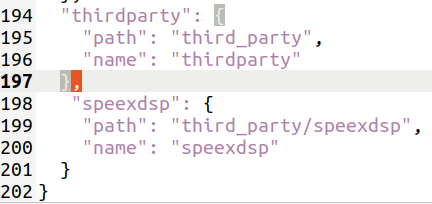
修改vendor/hihope/rk3568/config.json文件将speexdsp添加至rk3568开发板
将子系统及其组件加入产品定义中,以rk3568为例,产品定义文件在vendor/hihope/rk3568/config.json,需要将以下内容添加到config.json中:
{
"subsystem": "speexdsp",
"components": [
{
"component": "speexdsp",
"features": []
}
]
},
 蜀ICP备20004578号
蜀ICP备20004578号